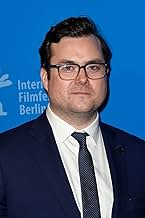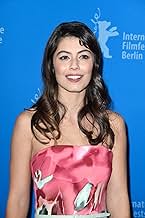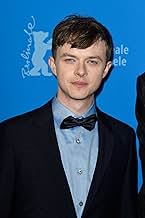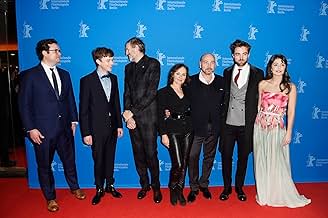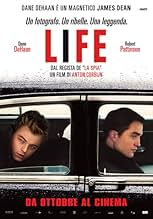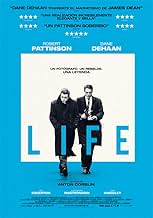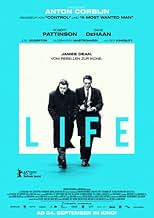IMDb-BEWERTUNG
6,0/10
9236
IHRE BEWERTUNG
Ein Fotograf des Life Magazine wird beauftragt, Aufnahmen von James Dean zu machen.Ein Fotograf des Life Magazine wird beauftragt, Aufnahmen von James Dean zu machen.Ein Fotograf des Life Magazine wird beauftragt, Aufnahmen von James Dean zu machen.
Dane DeHaan
- James Dean
- (as Dane Dehaan)
Empfohlene Bewertungen
"Life (2015)" is the fourth film directed by notorious Dutch photographer and director Anton Corbijn, in which we get a look into the life of James Dean. Corbijn proves to be an accomplished director since the release of his debut and gritty masterpiece "Control (2007)". A film that set the bar so high it became hard to satisfy his newly found fan-base. After his escapades with the thriller genre he returns to the genre he became known for, a biopic. And this time our favorite "Rebel" gets the "Corbijn- treatment", or so we hope.
As the title suggests the story revolves around Dennis Stock, a photographer for the magazine "Life", who gets the assignment to shoot rising and rebellious Hollywood actor James Dean, before the release of his first headlining film "East of Eden (1955)". A friendship develops between both gentleman and the pair travel to L.A., New York and Indiana to get those precious shots Stock is longing for.
DeHaan rather gives us his own interpretation of James Dean. The resemblance between portraying and portrayed actor is marginal. Stock on the other hand is portrayed by Pattison who gives a dull performance although the concept of his role feels dull on its own, something we can't blame Pattinson for directly. Stock's assignment and private life should feel like a struggle though this is poorly translated into the script.
Throughout the movie there are sparks of chemistry between both but in the end it's sad to see that this chemistry is absent for most of the film. It's because of these aspects this period drama sometimes feels like it's sleepwalking throughout its own story, which is a shame considering the fact that "Life" can be considered as almost a personal film for Corbijn. You might expect that a photographer making a film about photography would create something more lively than the overall boring "Life".
Maybe Corbijn made us spoiled little brats, we expect too much from the director that gave us "Control", while you can't blame an audience for expecting something more daring than "Life". James Dean was not only a fascinating character, he also possessed a complexity towards his sexual identity, something the film largely ignores. In conclusion there are some pleasing touches, such as the beautiful cinematography or a refreshing cameo by Ben Kingsley, but in the end this film becomes a frustrating experience for Corbijn fans.
As the title suggests the story revolves around Dennis Stock, a photographer for the magazine "Life", who gets the assignment to shoot rising and rebellious Hollywood actor James Dean, before the release of his first headlining film "East of Eden (1955)". A friendship develops between both gentleman and the pair travel to L.A., New York and Indiana to get those precious shots Stock is longing for.
DeHaan rather gives us his own interpretation of James Dean. The resemblance between portraying and portrayed actor is marginal. Stock on the other hand is portrayed by Pattison who gives a dull performance although the concept of his role feels dull on its own, something we can't blame Pattinson for directly. Stock's assignment and private life should feel like a struggle though this is poorly translated into the script.
Throughout the movie there are sparks of chemistry between both but in the end it's sad to see that this chemistry is absent for most of the film. It's because of these aspects this period drama sometimes feels like it's sleepwalking throughout its own story, which is a shame considering the fact that "Life" can be considered as almost a personal film for Corbijn. You might expect that a photographer making a film about photography would create something more lively than the overall boring "Life".
Maybe Corbijn made us spoiled little brats, we expect too much from the director that gave us "Control", while you can't blame an audience for expecting something more daring than "Life". James Dean was not only a fascinating character, he also possessed a complexity towards his sexual identity, something the film largely ignores. In conclusion there are some pleasing touches, such as the beautiful cinematography or a refreshing cameo by Ben Kingsley, but in the end this film becomes a frustrating experience for Corbijn fans.
Not that this necessarily pertains to the period of interaction between Dean and a photographer, but Dean was a race car driver. He was heavily involved in that during that year. So he wasn't just a restless spirit laying around. He had a daredevil spirit and lots of races. He was portrayed here as a bored farm boy.
What I did like was showing how people get to know each other over time, and how life is actually fairly boring even for a burgeoning star during the inactive hours of a week. Even James Dean has to eat, sleep, visit family, and sign paperwork.
But there was not much reason shown for anyone to find Dean interesting. Even the photographer, who was initially captivated by some indescribable quality, scolded him for being a whiny self-interested nobody.
Having said that, and having read comments from Dean fans, I am willing to believe that the real Dean had charisma and a face that expressed pain and depth.
I liked the farm sequence. It showed you that Dean wasn't really a rebel, because he loved his family, his home town, and America. Everyone comes from somewhere. He's from a sleepy small town in the Midwest and his mother died when he was young. That should explain his sleepy demeanor tinged with sadness.
The nudity was great, because that girl was beautiful. But it was totally gratuitous. There is absolutely no reason to show boobs when two people are talking in bed.
You do get a sense that the country is on the brink of a new vibe, with the balance of old and new in the culture., and our characters' comfort in hanging out with black folks.
Look, there's not much to this story, but it is mildly interesting to see the life of a struggling early Hollywood photographer, and a fresh star. Plus I always enjoy depictions of male bonding, with all their ups and downs.
Unless those things interest you, avoid it. Because like life itself, this thing is dull.
But there was not much reason shown for anyone to find Dean interesting. Even the photographer, who was initially captivated by some indescribable quality, scolded him for being a whiny self-interested nobody.
Having said that, and having read comments from Dean fans, I am willing to believe that the real Dean had charisma and a face that expressed pain and depth.
I liked the farm sequence. It showed you that Dean wasn't really a rebel, because he loved his family, his home town, and America. Everyone comes from somewhere. He's from a sleepy small town in the Midwest and his mother died when he was young. That should explain his sleepy demeanor tinged with sadness.
The nudity was great, because that girl was beautiful. But it was totally gratuitous. There is absolutely no reason to show boobs when two people are talking in bed.
You do get a sense that the country is on the brink of a new vibe, with the balance of old and new in the culture., and our characters' comfort in hanging out with black folks.
Look, there's not much to this story, but it is mildly interesting to see the life of a struggling early Hollywood photographer, and a fresh star. Plus I always enjoy depictions of male bonding, with all their ups and downs.
Unless those things interest you, avoid it. Because like life itself, this thing is dull.
The problem with this movie is that neither DeHaan, nor Pattinson hold the attention of the audience. The script is nondescript, and the directing cannot make up for the lack of a compelling story and characterization.
DeHaan looks like a childish version of Dean with his unlined face, rounded cheeks, feathered, rubbable hair and those full, pink lips.
Dean was young, but had an old soul reflected in his lined face, sunken eyes, and impossibly attractive visage. Even James Franco -- much as I detest that actor -- was better than DeHaan. The story had no real climax... its twin journeys (of the co-protagonists) made shallow and dull via the absence of any real conflict or urgency of mission.
I'm sure Corbijn had good intentions.
I gave this one a four.
DeHaan looks like a childish version of Dean with his unlined face, rounded cheeks, feathered, rubbable hair and those full, pink lips.
Dean was young, but had an old soul reflected in his lined face, sunken eyes, and impossibly attractive visage. Even James Franco -- much as I detest that actor -- was better than DeHaan. The story had no real climax... its twin journeys (of the co-protagonists) made shallow and dull via the absence of any real conflict or urgency of mission.
I'm sure Corbijn had good intentions.
I gave this one a four.
James Dean, although the lead-star of only three films, concreted himself as one of the cinema's golden age legends quite quickly in the 1950's - mainly through his unconventional approach to Hollywood's rules - this is, all before his premature death quite soon later.
Portrayed by Dane Dehaan, LIFE is a satirical chronicle of Dean's rise of an unknown to his Hollywood acting debut of success and fame. Yet, the film is not directly told as a documentary of his life - but via the lens of Robert Pattinson's character, Dennis Stock, a rookie photographer for a photo-agency with aspirations of becoming known.
Set in the 1950's, director Anton Corbijn's take on Dean's life is admirably applaudable as it takes us on an inside look of Dean's short lived fame and anti-fame. The sets, the cinematography, the music and the atmosphere all cipher the 50's pose, as smoking and larger-than-life LA are the standard.
First meeting at a party in 1955, Dennis (the photographer) approaches Dean; a young, sophisticated individual wearing a melo- polo, slicked hair with thick framed glasses and asks who he is. For Dehaan, the performance, both visually and in terms of acting is undeniably suited as he resonates Dean's moody and unique approach, showing him as a person, not merely an icon.
Forming sturdy relationships with Jack Warner (Ben Kingsley), of Warner Brothers Pictures, Dean's talent is soon spotted, and through several frustrations of the individual's motives, he told to 'play the part, follow the rules' and he would be made a star.
For Robert Pattinson, his take on iconic photographer Dennis Stock is equally as impressive as he enters the world of Hollywood from the other side of the carpet (and at bottom). Spotting Dean's talent early, Stock, in the two-hour running time attempts to get photographs of Dean before fame kicks in. Deadlines, pressure and awkwardness soon mount-up, and Pattinson expertly presents it onto screen.
Shot-by-shot, we capture each of Stock's photos of James Dean - but, rather than just a photo and what point it was taken - we are inclusively taken into a perspective of why it was taken, the setting and how they were so important - and now, in retrospective of our present - why so iconic.
http://gonewiththemovies.com/reviews/life-review.php
Portrayed by Dane Dehaan, LIFE is a satirical chronicle of Dean's rise of an unknown to his Hollywood acting debut of success and fame. Yet, the film is not directly told as a documentary of his life - but via the lens of Robert Pattinson's character, Dennis Stock, a rookie photographer for a photo-agency with aspirations of becoming known.
Set in the 1950's, director Anton Corbijn's take on Dean's life is admirably applaudable as it takes us on an inside look of Dean's short lived fame and anti-fame. The sets, the cinematography, the music and the atmosphere all cipher the 50's pose, as smoking and larger-than-life LA are the standard.
First meeting at a party in 1955, Dennis (the photographer) approaches Dean; a young, sophisticated individual wearing a melo- polo, slicked hair with thick framed glasses and asks who he is. For Dehaan, the performance, both visually and in terms of acting is undeniably suited as he resonates Dean's moody and unique approach, showing him as a person, not merely an icon.
Forming sturdy relationships with Jack Warner (Ben Kingsley), of Warner Brothers Pictures, Dean's talent is soon spotted, and through several frustrations of the individual's motives, he told to 'play the part, follow the rules' and he would be made a star.
For Robert Pattinson, his take on iconic photographer Dennis Stock is equally as impressive as he enters the world of Hollywood from the other side of the carpet (and at bottom). Spotting Dean's talent early, Stock, in the two-hour running time attempts to get photographs of Dean before fame kicks in. Deadlines, pressure and awkwardness soon mount-up, and Pattinson expertly presents it onto screen.
Shot-by-shot, we capture each of Stock's photos of James Dean - but, rather than just a photo and what point it was taken - we are inclusively taken into a perspective of why it was taken, the setting and how they were so important - and now, in retrospective of our present - why so iconic.
http://gonewiththemovies.com/reviews/life-review.php
Greetings again from the darkness. The film's title has multiple meanings: "Life" Magazine as the source for the famous photographs we have seen so many times; the crossroads in "Life" of both rising star James Dean and photographer Dennis Stock; and a philosophical look at "Life" - how quickly things can change, and how we should appreciate the moments.
Director Anton Corbijn (A Most Wanted Man, The American) and screenwriter Luke Davies offer up a snapshot of 1955 as the not-quite-yet-famous James Dean (Dane DeHaan) traveled cross-country with photographer Dennis Stock (Robert Pattinson) from Los Angeles to New York to Indiana. Each man was searching for their true self as Stock's professional ambition and personal stress are palpable, while 24 year old Dean's ambivalence about his pending superstardom borders on self-destructive.
DeHaan and Pattinson both underplay their roles, and it's certainly more than a little confusing to see Pattinson in a movie about James Dean where he is not the actor playing the icon. DeHaan captures the low key, soft-spoken side of Dean but only teases at the "rebel" studio head Jack Warner (Sir Ben Kingsley) wanted so badly to control. We get a feel for Dean's vision of challenging roles in quality productions a commitment to the art of acting he no doubt sharpened in his time with acting guru Lee Strasberg. The story leans more heavily to the tale of photographer Stock, which is unfortunate, because he is significantly more awkward than interesting. Pattinson plays him as a social misfit who broods nearly as much as the "moody" young actor he is stalking through the streets.
The period look is well appointed, and we are privy to some of the moments of Dean's life just prior to the release of East of Eden and his being cast in Rebel Without a Cause. His relationship with Pier Angelli (Alessandra Mastronardi), friendship with Eartha Kitt (Kelly McCreary), and his bond to the family and farm of his childhood in Indiana are all captured. In fact, it's the clumsy relationship with Stock that comes across as the least realistic portion though it may very well have happened this way. Even the manner in which the famous photographs were taken is underplayed although it makes for a terrific tie-in with the closing credits where the real Stock/Life Magazine photographs are displayed.
It's now been 60 years that James Dean has exemplified Hollywood "cool", a label that can never be removed due to his tragic death in 1955 after making only three films. Capturing the essence of what made Dean cool is unnecessary because it's present in every scene of those three films, as well as the photographs taken by Dennis Stock. That's all the legacy either man needs.
Director Anton Corbijn (A Most Wanted Man, The American) and screenwriter Luke Davies offer up a snapshot of 1955 as the not-quite-yet-famous James Dean (Dane DeHaan) traveled cross-country with photographer Dennis Stock (Robert Pattinson) from Los Angeles to New York to Indiana. Each man was searching for their true self as Stock's professional ambition and personal stress are palpable, while 24 year old Dean's ambivalence about his pending superstardom borders on self-destructive.
DeHaan and Pattinson both underplay their roles, and it's certainly more than a little confusing to see Pattinson in a movie about James Dean where he is not the actor playing the icon. DeHaan captures the low key, soft-spoken side of Dean but only teases at the "rebel" studio head Jack Warner (Sir Ben Kingsley) wanted so badly to control. We get a feel for Dean's vision of challenging roles in quality productions a commitment to the art of acting he no doubt sharpened in his time with acting guru Lee Strasberg. The story leans more heavily to the tale of photographer Stock, which is unfortunate, because he is significantly more awkward than interesting. Pattinson plays him as a social misfit who broods nearly as much as the "moody" young actor he is stalking through the streets.
The period look is well appointed, and we are privy to some of the moments of Dean's life just prior to the release of East of Eden and his being cast in Rebel Without a Cause. His relationship with Pier Angelli (Alessandra Mastronardi), friendship with Eartha Kitt (Kelly McCreary), and his bond to the family and farm of his childhood in Indiana are all captured. In fact, it's the clumsy relationship with Stock that comes across as the least realistic portion though it may very well have happened this way. Even the manner in which the famous photographs were taken is underplayed although it makes for a terrific tie-in with the closing credits where the real Stock/Life Magazine photographs are displayed.
It's now been 60 years that James Dean has exemplified Hollywood "cool", a label that can never be removed due to his tragic death in 1955 after making only three films. Capturing the essence of what made Dean cool is unnecessary because it's present in every scene of those three films, as well as the photographs taken by Dennis Stock. That's all the legacy either man needs.
Wusstest du schon
- WissenswertesJames Dean's article written for LIFE Magazine was not very popular at the time when it was first released.
- PatzerPay phones in 1955 did not have metal cords or the receivers shown in the film.
- Zitate
James Dean: One more orgasm behind you and one step closer to death.
Top-Auswahl
Melde dich zum Bewerten an und greife auf die Watchlist für personalisierte Empfehlungen zu.
- How long is Life?Powered by Alexa
Details
- Erscheinungsdatum
- Herkunftsländer
- Offizieller Standort
- Sprache
- Auch bekannt als
- 叛逆年代
- Drehorte
- Produktionsfirmen
- Weitere beteiligte Unternehmen bei IMDbPro anzeigen
Box Office
- Budget
- 12.000.000 $ (geschätzt)
- Weltweiter Bruttoertrag
- 1.231.606 $
- Laufzeit
- 1 Std. 51 Min.(111 min)
- Farbe
- Seitenverhältnis
- 2.35 : 1
Zu dieser Seite beitragen
Bearbeitung vorschlagen oder fehlenden Inhalt hinzufügen








